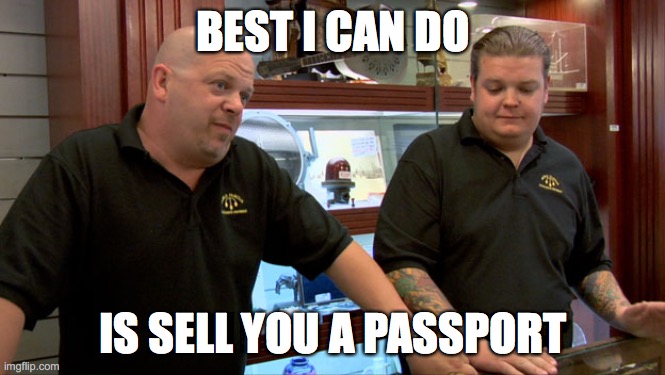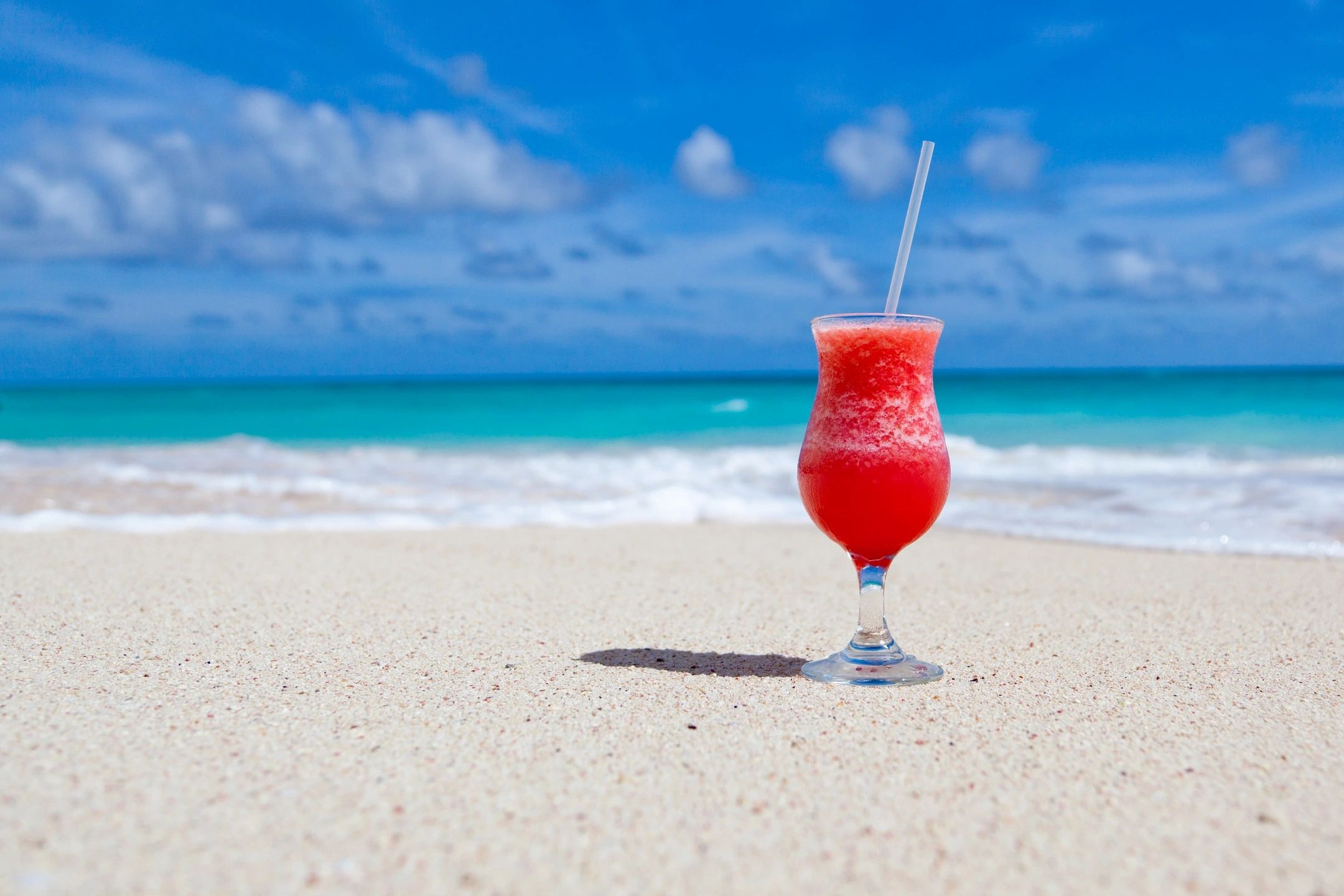This Country Sells Plastic Booklets for its GDP
There’s a Caribbean country that is particularly known for it’s program called Citizenship-by-Investment (CBI) whereby a donation to their state fund or a purchase of real estate (subject to terms/restrictions) can grant you a passport & consequently naming yourself a citizen of that twin-island country.
The country I’m referring to is Saint Kitts and Nevis (although there’s 4 other Caribbean countries with similar programmes). This program has been active since 1984 and has sold over well over 16,000 passport citizenships. This becomes an excellent alternative for someone seeking a Plan B citizenship, a US citizen looking to renounce US citizenship, someone looking to legally reduce their taxes (to basically 0), to get new travel benefits or simply adding to a strange [& expensive] passport collection. Regardless of the reason, customers are coming for the economic citizenship from all corners of Earth.
Reminder to Follow on Twitter!
From 2021-2022 interest in this programme has absolutely exploded. I’ve had a call with a lawyer months ago who said that most of their legal work has swapped from the formation of LLCs and Trusts (two corporate entities that are attractive for international planning in their country) to the management of CBI applications. I’ve heard from another lawyer who told me she could not help me because she (according to reviews was a great source for legal activities) only focuses on CBI applicants now.
However, as you may or may not be aware, a big change for Saint Kitts and Nevis has happened with respect to this program. Given the lobbying from the United Kingdom, European Union and Washington, D.C. to bend to their rules, the program itself will be amended.
The changes are marketed to “boost investor confidence” in the program and bolster the country’s reputation (1.6 Billion doesn’t count?). The changes include a new Sustainable Island State Contribution (SISC) investment option for foreign nationals investing at least USD 250,000 (or USD 300,000 for a family of two or USD 350,000 for a family of three and four) to help advance St. Kitts and Nevis into a sustainable island state. The St Kitts and Nevis government say this is to increase local food production, transition to “green energy”, diversify the economy, attract and support “sustainable industries”, evolve the creative economy, recover from the impact of the COVID-19 pandemic, and expand social protection.
There is an option for real-estate as well, but, that received a bump in price as well. For real estate investments, the minimum investment doubled to $400,000 for condominiums and to $800,000 for single-family dwellings–all of which must be pre-approved by the government with limited means of payment, strict “source of funds” protocols and restricted rights to sell the property.
Besides the fact that they’ll hardly make any such “sustainability” changes–the sole reason I fail to believe them is because the government had previously reduced their donation requirement from 150,000USD to 125,000 USD. The USD 125,000 for a main applicant was such a success, they wisely decided to extend this discount for another 6 months and within a mere month of this extension, the amount doubled following foreign pressure.
And why do I say bend to their rules (EU, USA, USA) or foreign pressure? As demanded, all due diligence on CBI applicants will be conducted by independent professional third-party firms based in the US, UK, or the EU only commissioned by the government of St Kitts and Nevis. They effectively forced the control of the regulatory process under their thumb, outside of St Kitts and Nevis.
This change also includes that all investors applying for CBI are now required to undergo an interview, virtually or in-person at specified places.
Other changes include limitations on the methods by which the CBI program can be advertised internationally. In other words, the countries themselves are provided a vague order to limit the marketing of their own program, of advertising their own proud economic sovereignty.
Let’s say you go through the new changes and you’re accepted. Well with these new changes you’re not done yet…Once a CBI application is approved, applicants must collect a certificate of registration in person from St Kitts or Nevis or at one of the country’s embassies or consulates abroad (check flight costs to Basseterre)
None of this was previously required–but because they had a decent system in place beforehand.
It should be stressed that the due diligence process for Saint Kitts and Nevis holds the legal fees of 35,000 USD + an application fee not included in the original donation or home purchase. In addition to the cost, the documents already requested were very thorough, too. It involves lots of Know-Your-Customer paperwork + many signatures of your photographs, CV/resumes, police checks, notarized forms, source of funds information, medical certificates including blood examinations & others. The checklist is tiresome to read already even without these new changes. This is all about being blackmailed by the USA/UK/EU who may not want their citizens finding a Plan B that easily anymore.
All of this is over the threat over losing visa free access to the EU and UK (thus, reducing the potency of the citizenship and hurting the program). So they had the decision to make, do we play ball? or respect our own sovereignty. Comply or die? Upon a closer look, they were never in the driver seat to decide at all.
According to a 2023 IMF report, they state that from 2017 to 2021 a staggering 65% of the economy was fuelled by CBI revenue and that since then a “surge” in CBI has occurred (probably what the lawyers were talking about). This has allowed a public debt to GDP ratio of 135% to be paid down to 60% for most of the last 5 years–>kudos to them.
Some have questioned whether CBI programmes such as this are now ‘dead’. My take is it depends on where the citizen is coming from & why one would want this passport.
I believe there’s 3 types of people who may purchase this passport.
- Westerners seeking to detach from their high regulation, high tax, cold, expensive society
- People born in a less-than-attractive country on the Passport index such as Morocco, Vietnam or Bolivia.
- People seeking a citizenship/resident to pay zero tax depending on their income sources.
CBI programmes don’t appear to be dead, there will remain some life in them yet but this recent change has exposed what you’re getting that go beyond the pages of plastic. You’re getting a citizenship to a country that truly does not hold any autonomy in its own affairs. You’re not ‘detaching’ from the ‘West’ if they can so easily snap their fingers and change a countries policy that quite literally runs a majority of their activity. This was done with respect to vaccine mandates and border closures as well–but that’s a separate article. So for Westerners, there’s less of an allure.
Secondly, while a Canadian citizen may not be getting ‘a new look’ politically, they can still use their passport to access the UK even if his/her Nevis passport disallows him/her. The same cannot be said for a lesser regarded passport such as Morocco. However, I don’t care how deep your pockets are, Moroccan or not, 250,000 USD is a lot of money (not including all the legal fees, time wasted, paperwork, appointments & due diligence) for simple travel benefits. For this amount there’s likely a better alternative. For instance, you could secure a different island passport, grab a residency in Europe, a residency in South America for the heck of it and still have money left over for your kid’s private schooling & some gold bullion. While it’s understandable one would always want more travel options, it truly begs the question whether these travel privileges found in this citizenship are worth it.
Which leads to the last point–> Taxes. If one has these kind of pockets, chances are they can afford a good tax residency to save on tax in the first place; so why do you need a second zero tax item? There are many people with lots of cash behind them who are paying a sickening amount of tax every year I realize… although even with this, they are in a position where much of the world is available to them from 1-year residency certificates to long-term stays. They can legally achieve zero tax with a couple sessions with an international tax lawyer and some willingness to be flexible [on where you’re moving].
Therefore, for the investors motivated by tax savings–it may be smarter to get a passport (or at least work towards) one that is politically opposite to your birth place (West vs. East) to diverse geopolitical risk.
Closing
For the time being, Saint Kitts and Nevis is still under the influence of the Western hemisphere and I think that’s the point that these recent changes show.
Even if all of this sits okay with you given your situation, the fact of the matter is that this country does not produce anything. They have no oil reserves nor any mineral resources, a weakening tourism industry, no meaningful agricultural or livestock production, no tech innovations, few banking options, no major universities, a declining manufacturing centre, etc. In the event you have to live here or plan to, you’re electing to sign up to a nation that is already working at a deficit without any leverage to offer the world. These Plastic Booklets are the leverage. The number one way they’re managing their debts is by selling these economic citizenships–if that were to ever run into trouble, so would the entire country–which is where you now live!
As the [translated St Kitts Creole] saying on the island goes, “A dog never knows how big it is until it swallows a bone”; let’s see how big the dog is relative to this future economic bone.
*Stay tuned for the NEAR launch of Open Door Consultancy to assist you in your own internationalization plans! * In the meantime, contact here
#StayOnTheBall



